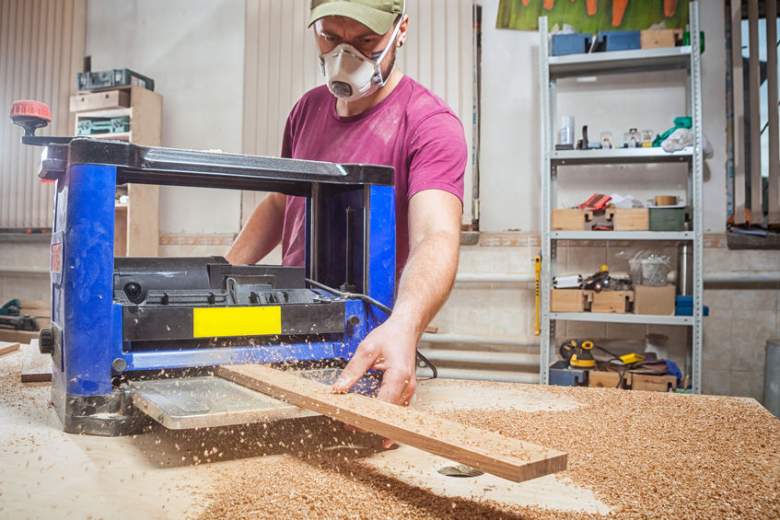
A thickness planer is an essential piece of equipment for woodworkers or do-it-yourselfers. Whether you’re a beginning woodworker or a professional handyman, a thickness planer is an essential power tool in your workshop to shave down pieces of wood to the desired size.
You can build yourself a sweet little portable workshop with a benchtop planer and a brand-new generator. Then you will be able to work where ever and whenever. Check out the best options for benchtop planers below to make your life a whole lot easier.
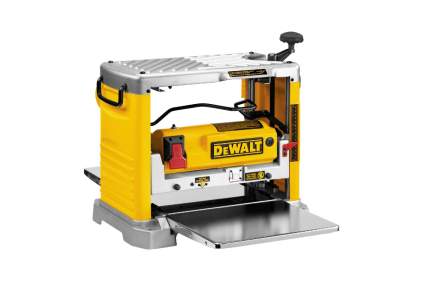
|
Amazon Customer Reviews
|
Price: $549.00 Shop at Amazon | Shop now Read our review |
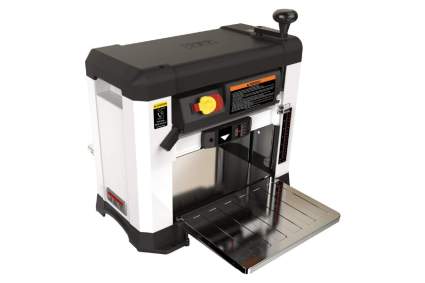
|
Amazon Customer Reviews
|
Price: $872.74 Shop at Amazon | Shop now Read our review |
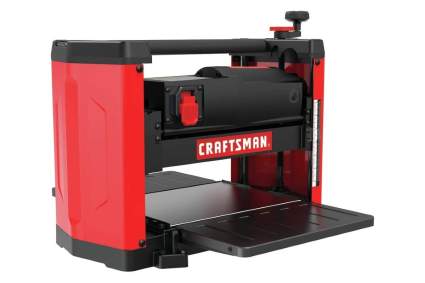
|
Amazon Customer Reviews
|
Price: $299.00 Shop at Amazon | Shop now Read our review |
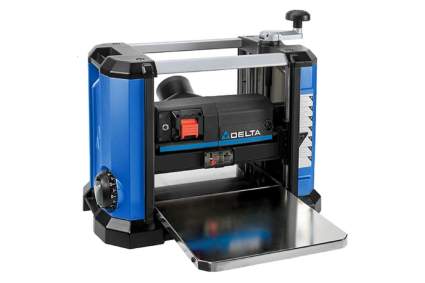
|
Amazon Customer Reviews
|
Price: $799.00 Shop at Amazon | Shop now Read our review |
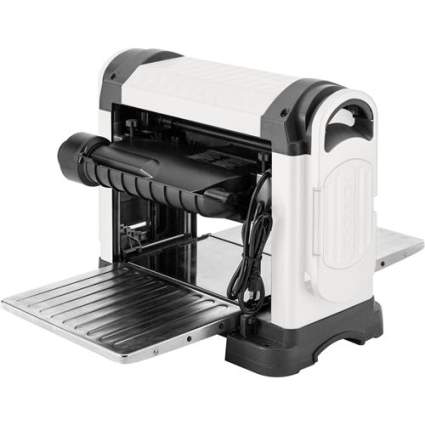
|
Amazon Customer Reviews
|
Price: $799.00 Shop at Amazon | Shop now Read our review |
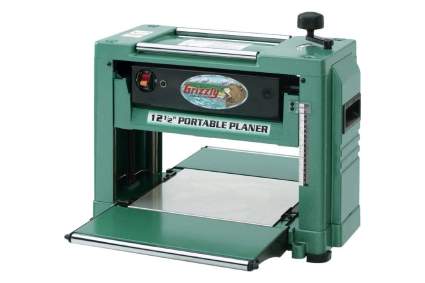
|
Amazon Customer Reviews
|
Price: $611.95 Shop at Amazon | Shop now Read our review |
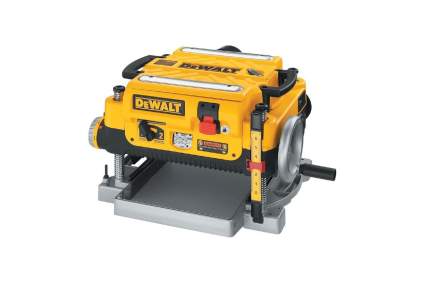
|
Amazon Customer Reviews
|
Price: $646.87 Shop at Amazon | Shop now Read our review |
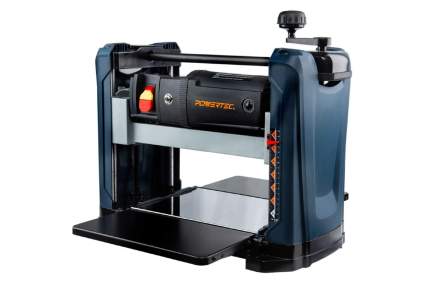
|
Amazon Customer Reviews
|
Price: $389.99 Shop at Amazon | Shop now Read our review |
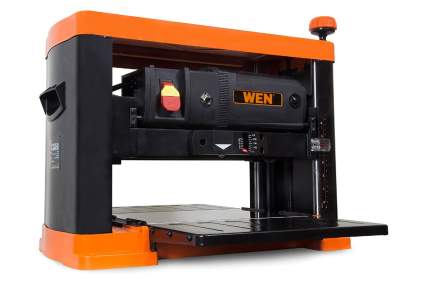
|
Amazon Customer Reviews
|
Price: $407.69 Shop at Amazon | Shop now Read our review |
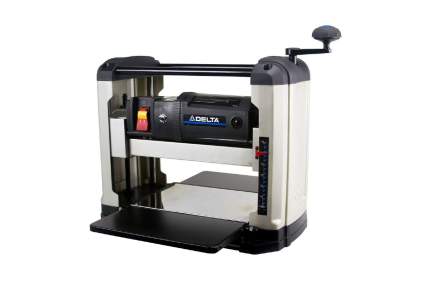
|
Amazon Customer Reviews
|
Price: $5,998.98 Shop at Amazon | Shop now Read our review |
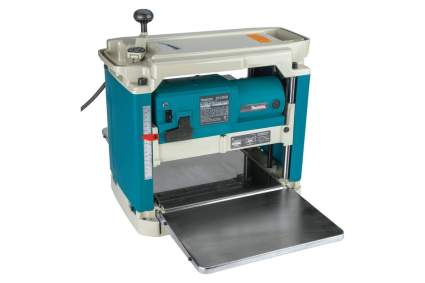
|
Amazon Customer Reviews
|
Price: $833.29 Shop at Amazon | Shop now Read our review |
-
1. DeWalt DW734 15 Amp Single Speed Benchtop Planer
Pros:- Four-column carriage lock
- 15 Amp motor
- 12.5 inch stock width capability
- Easy to move
Cons:- Infeed and outfeed tables unlevel
- Height control screw is too short
- More passes than other planers
The DeWalt DW734 15 Amp Single Speed Benchtop Planer features a powerful 15 Amp motor that delivers 10,000 RPM with a three-knife cutter head. This benchtop planer offers quick, accurate depth adjustment, extra-long feed tables for material support, and the convenience of knives that are reversible and disposable.
This planer delivers 96 cuts per inch for an incredibly fine finish on your boards. The cutting knives will last 30 percent longer than traditional knives that take time and money to resharpen. Cut depth is 1/8-inch maximum and a six-inch depth capacity for stock up to 12-1/2-inches.
The DeWalt DW734 Benchtop Planer offers fast, easy, one-tool knife changes when needed. A set of pins machined on the cutter head goes through holes machined on the knife. This helps locate the fresh knife and refasten the knife clamp.
Find more DeWalt DW734 15 Amp Single Speed Benchtop Planer information and reviews here.
-
2. Jet JWP-13BT Helical-Style Benchtop Planer
Pros:- 10,000 RPM helical-style cutter head
- Dual infeed speed control
- Four-inch diameter wood chip output
- Energy efficient
Cons:- Blades aren't cheap when replacing
- Blades may dull quickly
- Price point
The Jet JWP-13BT Helical-Style Benchtop Planer is a good planer for a small workshop or for a remote job site. When planing boards, and given suitable adjustments, your stock won’t need much in the way of sanding afterward. The Jet JWP-13BT features a helical-style cutter head; instead of two or three long blades doing all the work, the head contains six rows of 24 smaller blades that create that nice, smooth finish.
This benchtop planer features a positive stop system, that is you can set the stop for a certain depth then work for your boards down to that thickness. This is the only small “lunchbox” planer that I’ve seen that has this amenity typically reserved for larger commercial models. With all that removal of material, it’s got to go somewhere, and in this case, it’s ejected out of the four-inch dust coupler on the back of the unit. Hook up your dust collector or a shop vac with this adapter (sold separately).
Find more Jet JWP-13BT Helical-Style Benchtop Planer information and reviews here.
-
3. Craftsman 15 Amp Benchtop Planer
Pros:- 15 Amp motor
- Quick-change cutterhead
- 16,000 cuts per minute
- Easy to use
Cons:- Somewhat difficult setup
- Height adjustment is tricky
- Depth gauge measured by tenths of an inch
Craftsman products and the Craftsman 15 Amp Benchtop Planer don’t disappoint. Setup is simple; make sure you put the planer on a level workbench to straighten out the infeed and outfeed tables. This will save you from scallops and snipe damage down the road!
Cutting boards up to 12 inches in width with the Craftsman is a breeze. The 8,000 RPM cutting head with two reversible knives removes material from your stock with no problem. 16,000 cuts per minute will generate a load of wood chips and dust; the collection feature has a chute that can face either way so you can hook it up to a shop vac or dust collection system and it works well.
Find more Craftsman 15 Amp Benchtop Planer information and reviews here.
-
4. Delta Power Tools 22-590X Benchtop Planer
Pros:- Three-blade cutter head
- Infinite micro-adjust depth stop
- Material removal gauge
- Great performance
Cons:- Belts seem to break easily
- Heavy
- Price point
The Delta Power Tools 22-590X Benchtop Planer features a performance level that competes with any of the planers on our list. It has a depth-of-cut gauge bar that spans the opening of the feed opening meaning you can count on accuracy no matter the width of the stock you’re working on. There are also six thickness stops that include 1/32-inch increments; nice for finish work.
The dust hood has a centered port and a wide expulsion opening that will spew chips out with the best of them. The cut quality is problem-free using incredibly sharp knives. The 26-feet-per-minute feed rate and powerful 15 Amp motor will cut through hardwood without slowing down.
You’ll experience snipe with the Delta 22-590X like any benchtop planer however the cutter head lock system should help to bring this down by a large margin. Delta claims that their infeed and outfeed tables are “best-in-class” but, also like any benchtop planers, they require significant adjustment to get true and level.
Find more Delta Power Tools 22-590X Benchtop Planer information and reviews here.
-
5. Shop Fox W1877 13″ Portable Planer
Pros:- Dependable
- Durable
- Versatile
- Long-lasting
Cons:- Price point
- Needs accessories
- Heavy
Planers will make the true handyman or woman’s life a lot easier, especially one that can handle bigger and smaller jobs like this one. If you are in the market for a new planer for your benchtop you should definitely check this planer out from Shop Fox. It features a 2HP, 120V, single-phase, 15A motor which is powerful enough to take care of any job you put in front of it but not so powerful that it isn’t energy efficient.
Also, check out these amazing generators that will help with getting the job done away from your shop or garage. Add some serious power on the go and get more jobs done in less time. Be the tool man you want to be with a dependable and super useful planer.
Find more Shop Fox W1877 13" Portable Planer information and reviews here.
-
6. Grizzly Industrial G0505 Benchtop Planer
Pros:- Small but tough
- Accurate depth adjustment
- Easy assembly
- Fun to use
Cons:- Struggles cutting more than 1/32-inch
- Needs to be clamped down
- Extension cord needed
Grizzly Industrial is known for larger, commercial planers but they also make this small shop variety, the Grizzly Industrial G0505 Benchtop Planer. It’s light enough to be portable but doesn’t lack muscle or design quality. It features a 15 Amp motor that spins the two-knife cutter head at 10,000 RPM. Boards may be planed at a 32 feet per minute rate using top-mounted return rollers and extra-large table extensions.
Knives are 1/8-inch thick rather than the 1/16-inch knives found in some other benchtop planers. Depth adjustment is very accurate; you’ll learn to work with this planer to not take off more material at a time than is appropriate. Assembly is next to no work so you can be up and running in less than ten minutes. Because it’s light, you’ll want to mount or clamp the Grizzly G0505 down when working.
Find more Grizzly Industrial G0505 Benchtop Planer information and reviews here.
-
7. DeWalt DW735 15 Amp Two-Speed Benchtop Planer
Pros:- Three-knife cutter head
- Two-speed gearbox
- 15 Amp 20,000 RPM motor
- Energy efficient
Cons:- Slower cutting speed
- Requires dust collector
- Noisier than similar planers
The DeWalt DW735 features a three-knife cutter head and a powerful 15 Amp motor that can handle deep cuts in tough hardwoods. It offers quick, accurate depth adjustment and uses knives that are both reversible and disposable. If you’re looking to get clean, a custom stock with a minimum of headache, this benchtop planer is the one for you.
The planer features a two-speed gearbox that delivers 96 or 179 cuts per inch. Use the slower speed when getting your rough material sized correctly then transition to the faster speed to achieve a finer finish. The DeWalt DW735 uses razor-sharp knives that are reversible and disposable and will last 30 percent longer than traditional disposable knives.
This planer comes with dust shrouds and knives however, you’ll need to also acquire the support tables, which are mandatory in order to use the DW735. That aside, the DeWalt DW735 offers additional power, cutting speed, and finishing amenities above most benchtop planers.
Find more DeWalt DW735 15 Amp Two-Speed Benchtop Planer information and reviews here.
-
8. Powertec PL1252 15 Amp Two-Blade Benchtop Planer
Pros:- Less expensive
- 9,400 RPM cutter head
- Side-mounted carrying handles
- Versatile
Cons:- Adapter needed
- Feed tray color comes off
- Requires adjustments
Looking for a truly portable benchtop planer that delivers some incredible cuts to your stock and won’t cut too much out of your wallet? Then the Powertec PL1252 15 Amp Two-Blade Benchtop Planer is here to catch your eye. Specifically designed to repurpose your worn-out and rough-sawn wood to life.
The Powertec PL1252 has all the bells and whistles, too, including an anti-wobble base, incremental depth adjustment, and easy to read depth gauge. It has an easy blade replacement feature with an index pin set up; you won’t need a blade gauge with this planer. There is some adjustment you’ll need to do with the feed tables and supports but once you’re dialed in, this benchtop planer is truly impressive, especially for the price.
Unfortunately, this thickness planer does not include knives or a dust port; they must be purchased separately.
Find more Powertec PL1252 15 Amp Two-Blade Benchtop Planer information and reviews here.
-
9. WEN 6552T 13-Inch Three-Blade Benchtop Planer
Pros:- Three-blade design
- 25,500 cuts per minute
- Feeds at 26 feet per minute
- Durable
Cons:- Fine tuning needed
- More plastic than other planers
- No granite table like the 6550T
The WEN 6552T 13-Inch Three-Blade Benchtop Planer is powered by a strong 15 Amp motor that provides over 25,500 cuts per minute at a 26 feet per minute feed rate. Stock up to 13 inches wide and 6 inches thick can pass through the two-blade cutting head with ease. This planer has an onboard planning gauge that shows the amount of material being removed during each pass; nice feature.
This benchtop planer includes height-adjustable infeed and outfeed tables to limit snipe while providing extra support to your workpiece during planing. It also has predrilled base holes so you can mount it to a workbench if you’d like. Customer service is a plus and for the price, the WEN 6552T is an outstanding addition to your shop.
Note: You’re going to need blades and you can find them here.
Find more WEN 6552T 13-Inch Three-Blade Benchtop Planer information and reviews here.
-
10. Delta Power Tools 22-555 Portable Thickness Planer
Pros:- Five-year warranty
- 28 feet per minute speed
- 18,800 cuts per minute
- Strong and durable
Cons:- Vibrates too much
- Loud
- Feed tables difficult to adjust for snipe issues
You’ll get enough bang for your buck with the Delta Power Tools 22-555 Portable Thickness Planer. It’s tough, works hard, and is durable enough to be a major component of your small woodworking shop. The components are solid and the castings are tight enough that there is little movement in the cutter head-feeder mechanisms. The build of the cutter head assembly and support columns are truly stout.
The cutting head spins at 9,400 RPM to allow for 18,800 cuts per minute. Blades are reversible so you’ll have two very sharp replacements with the same set; when you do have to change them out, the process is simple. Change tools are provided and stored in the machine.
While not meant for commercial applications, the Delta Power Tools 22-555 Portable Thickness Planer features a five-year warranty, the longest guarantee of any of the benchtop planers I looked at. The price point and the tough work this little planer puts out make it all definitely worth it.
Find more Delta Power Tools 22-555 Portable Thickness Planer information and reviews here.
-
11. Makita 2012NB 12-Inch Planer with Interna-Lok Automated Head Clamp
Pros:- Four-post design and diagonal brace stableize cutter head
- Low noise (83dB) compared with other planers
- Adjustable depth stop for repeat cuts
Cons:- Expensive
- Dust hood is a separate purchase
- Dust hood is a weird size for most any shop vac
This is probably the best benchtop planer of this size and category that you could get for your workshop. The Makita 2012NB 12-Inch Planer with Interna-Lok Automated Head Clamp is definitely not the least expensive however we’ll walk you through why this premium power tool might be worth the cost.
This planer is compact and weighs less than most other portable players. The cutting head may be accessed for faster, easier blade changes than pretty much anything else out there. That same cutting head features three disposable double-edged blades spinning at 8,500 RPM by way of a 15 Amp electric motor. The Makita 2012NB is the quietest planer in its class at only 83dB.
The four-post design and diagonal cross supports provide stability during operation along with the large table extensions that support the stock running through the planer. This benchtop planer can support boards of up to twelve inches thick, cutting up to a 1/8-inch at a time. The Makita 2012NB features an “Interna-Lok” automated head clamp that engages when needed to eliminate snipe from the ends of the stock.
This thing just works for you need it to. High-quality, well-engineered, and tops in its class, there’s a reason Makita charges more for this benchtop planer: it’s plain (ha) awesome.
One thing to note: Makita doesn’t include the dust hood in order to hook up a shop vac or dust collection system. It’s sold separately which seems a little short-sighted on Makita’s part and even then, you’ll need to customize it a bit as it won’t fit most shop vacs out there.
Find more Makita 2012NB 12-Inch Planer with Interna-Lok Clamp information and reviews here.
What is a Benchtop Planer?
A thickness planer is an essential piece of equipment for anyone into woodworking or do-it-yourself projects. In the simplest of terms, planers reduce the thickness of a wooden board. They are designed to spin a cutting head extremely fast to shave down rough stock in increments using multiple passes through the machine to achieve the desired board thickness.
Planers come in various forms including hand tools, both manual and electric, large table models, and commercial-grade units. Benchtop planers are an excellent option for home or light professional use, placed on a workbench top, located in small workshops, garages, or remote worksites. Portability is the most highly desired attribute for a benchtop planer.
How Will a Benchtop Planer Help with Woodworking Projects?
Benchtop planers can pay off in the long run by allowing the purchase of rough stock to finish it yourself. This lumber is less expensive than the finished stuff you find in the big box stores; given the price of wood these days, you may find that your planer will pay itself off in a hurry.
While these small planers will get things done, don't overestimate their capabilities. Benchtop planers have motors that typically remove just 1/8-inch or less at a time so you’ll be taking more time than a larger commercial unit that can remove much more material. Don’t worry, though: these small planers are totally fine for home shops that aren't on a production schedule.
Keep in mind that after milling, you may still need to sand or scrape your stock to remove scallop marks or snip (gouges on the ends of a board created when gripped by a one feed roller during production). Coarse then lighter sandings will typically remove both of these imperfections.
The quality of the benchtop planer you choose will go a long way in dealing with this issue. Cutterheads (the part of the thickness planer that holds the knives and quickly spins around to take off material from your board) that lock on their posts when boards engage the infeed rollers will cut down on this problem. Adjusting the infeed and outfeed tables working with your benchtop planer may also help.
What Features Should I Look For in a Benchtop Planer?
Besides how cool a benchtop planer will look in your workshop, there are some practical considerations to make when on the hunt for a benchtop planer. Interestingly enough, you won’t have to worry about comparing power rankings. Nearly all planers offer up a similar motor size with power enough to handle 1/8-inch-deep cuts in 12-inch-wide hardwoods.
As you might expect, planers make a severe mess with how many wood shavings they create when working. The ability to hook up a dust collector or vacuum is important. Some planers blow wood chips out of a vent by employing a built-in fan that draws the chips away from the cutter head.
That’s nice if the thickness planer rests away from the dust collector. Dust hoods that connect to a collection hose are included with some benchtop planers but some offer this only as an accessory.
Planers aren’t much good without some really, really (really!) sharp knives. Most straight-knife cutter head models feature self-indexing, double-edged knives which is good since knives that don't self-index are too much trouble to deal with. Also, look for an automatic cutter head lock so the head doesn’t turn while you remove the bolts and knives when changing them out.
It would be good to know how much wood you’re taking away with each pass through the planer so many of them have a gauge that shows exactly this. These gauges help you avoid taking too much material which may make snipe worse than normal.
Adjustable preset depth stops are nice, too, so you won’t make a board thinner than planned. This is a good thing if you have a bunch of boards that you’re looking to make the same thickness.
At the end of the day, you want a benchtop planer that will give you exceptional cut quality with an output requiring the least sanding necessary. You’ll want knives that wear for a long time and accurate gauges and scales that provide reliable measurements each and every time.
The ability to attach to a shop vac or dust collector is a definite plus. And a planer that’s somewhat quiet would be some sweet icing on the cake.
What's the difference between a benchtop planer and a jointer?
A jointer is a type of planer employed to trim down thin edges of wood stock. Like a table saw, a rotating blade spins just slightly above a metal surface and the lumber is pushed along the cutting space to smooth out inconsistencies in the wood. A benchtop planer, also known as a thickness planer, is used primarily for just that: cutting material away from wider surfaces in order to trim the thickness down to the measurement you want.
If you’re serious about woodworking at all, you’ll eventually need both a planer AND a jointer for the simple fact that you can get more out of a rough board by using both tools. The challenge is that these power tools aren’t exactly cheap so you may find yourself waiting for a few months between buying one and waiting to buy another. If you have to choose one over the other, get the benchtop planer first.
Jointers are great for squaring up thin edges and faces and they handle that very well. But they can only do it one face at a time meaning both sides won’t be parallel. Your board will be thinner on one end than it is on the other. Not good. In addition, they’re not meant to be set to a certain thickness like planers are.
Your benchtop planer can smooth out rough boards to make both faces clean, flat, and parallel. Yeah, the edges will be rough but you can use a router table, table saw or a circular saw with the right jigs to handle those. You could even trim them up with a hand plane.
Take a look at this video to get one idea of how a planer can also step in for a jointer if need be. However you do it, you can get done a lot more with a planer than a jointer...but once you get that gleaming piece of power tool awesomeness in your shop, then you’ll be cooking with gas.